Recent Posts
Most Popular
Physician job search tips after residency

Summary
- The job search process is critical, requiring careful planning, research and preparation.
- For new residency graduates, the transition to a professional career can be overwhelming.
- Review practical advice on finding the right job, developing a compelling CV, leveraging networking opportunities and preparing for interviews.
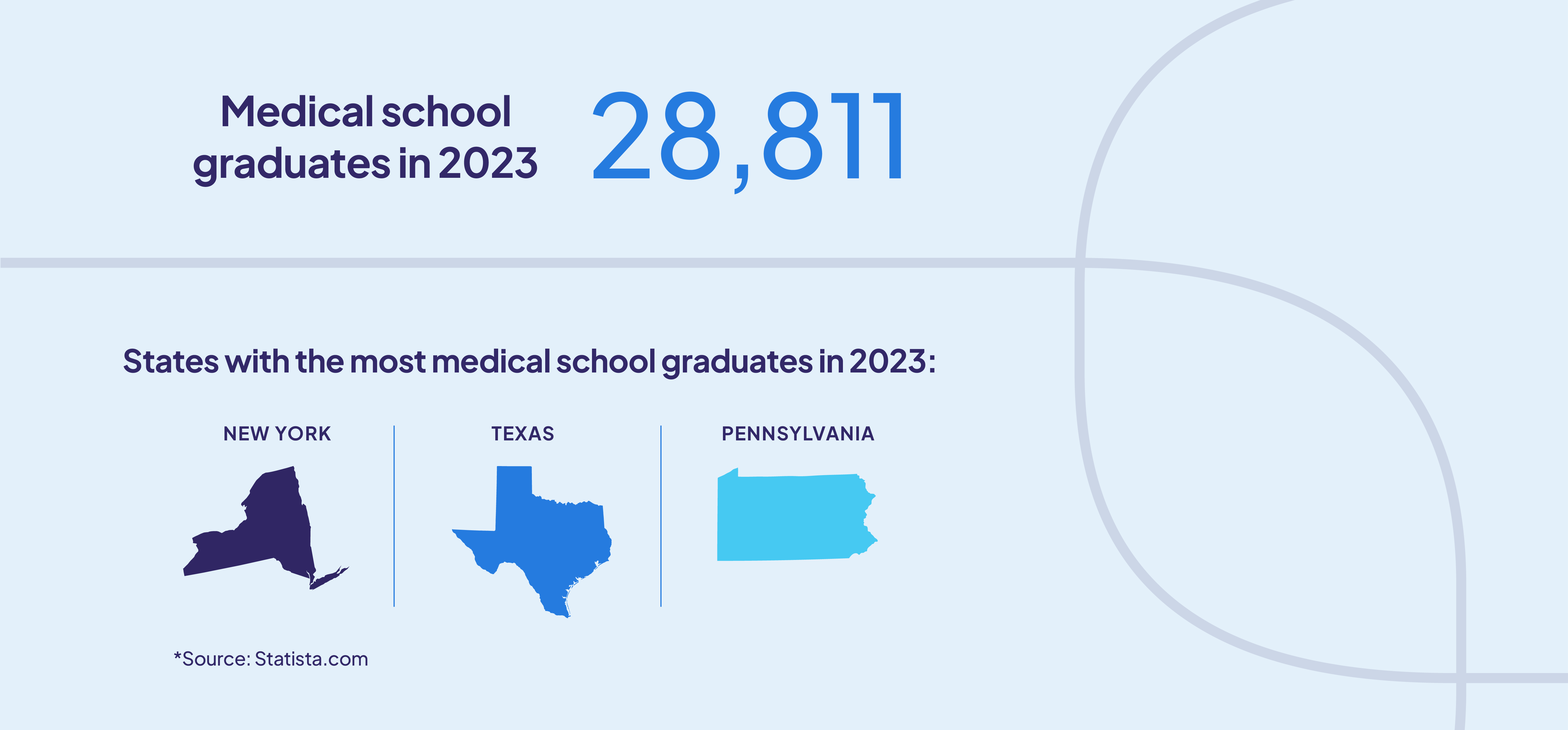
However, with thoughtful strategies, you can stand out from the crowd and find the perfect role. Here, I provide a glimpse of the essential steps in your physician job search journey, including:
- Identifying the right opportunities
- Developing your curriculum vitae (CV)
- Utilizing networking opportunities
- Acing your interviews
Overview: The physician job market
Job outlook
The need for physicians continues to grow, largely due to the increasing healthcare demands of an aging population, the number of current physicians reaching retirement age and the ongoing expansion of healthcare access. Because of these factors, and others, the Association of American Medical Colleges (AAMC), projects a shortage of up to 86,000 physicians by 2034. This forecast includes deficits in both primary and specialty care, creating significant opportunities for new graduates across multiple disciplines.
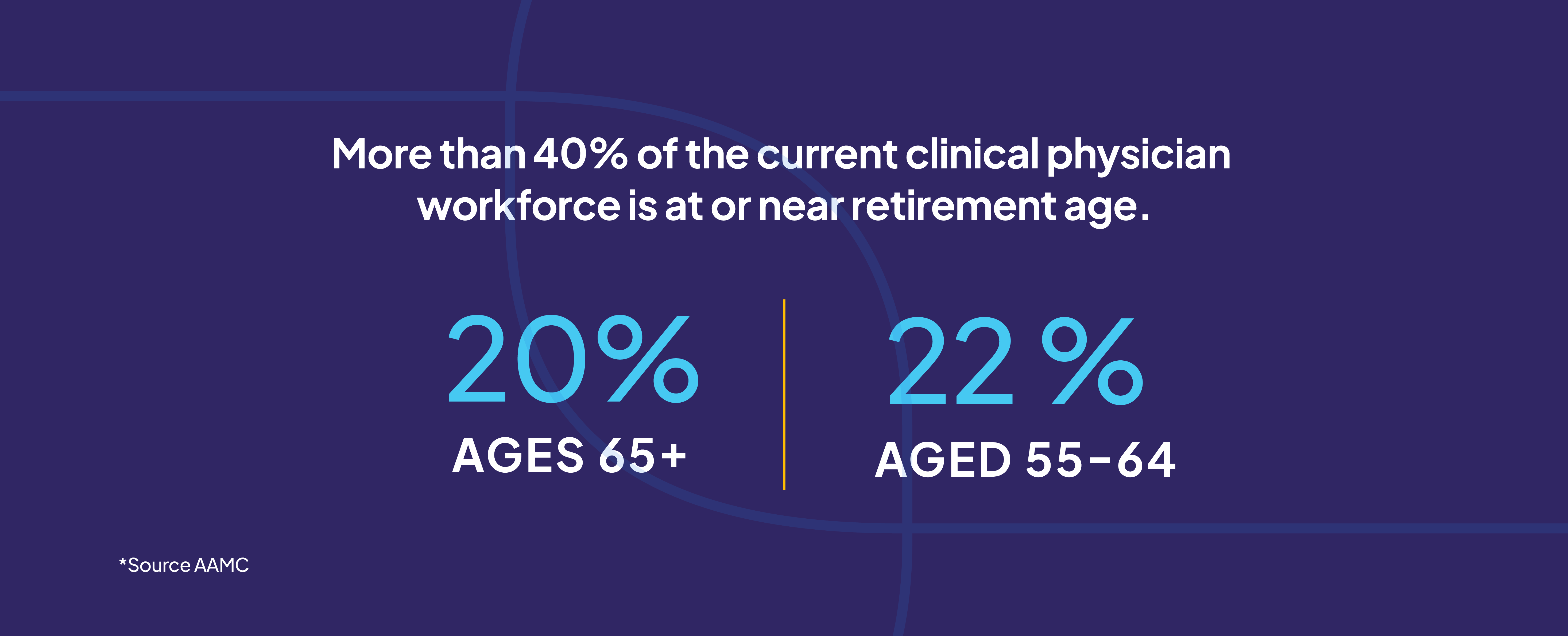
Key specialties in demand
Primary care physicians, including family medicine, internal medicine and pediatrics, are expected to be among the most in-demand specialties, according to the U.S. Bureau of Labor Statistics’ employment projections data for physicians and surgeons from 2023-33. Additionally, there will be increasing demand for specialties such as psychiatry, anesthesiology and surgery. Understanding which specialties are in high need can help you focus your job search efforts, especially if you’re flexible about where and how you practice.
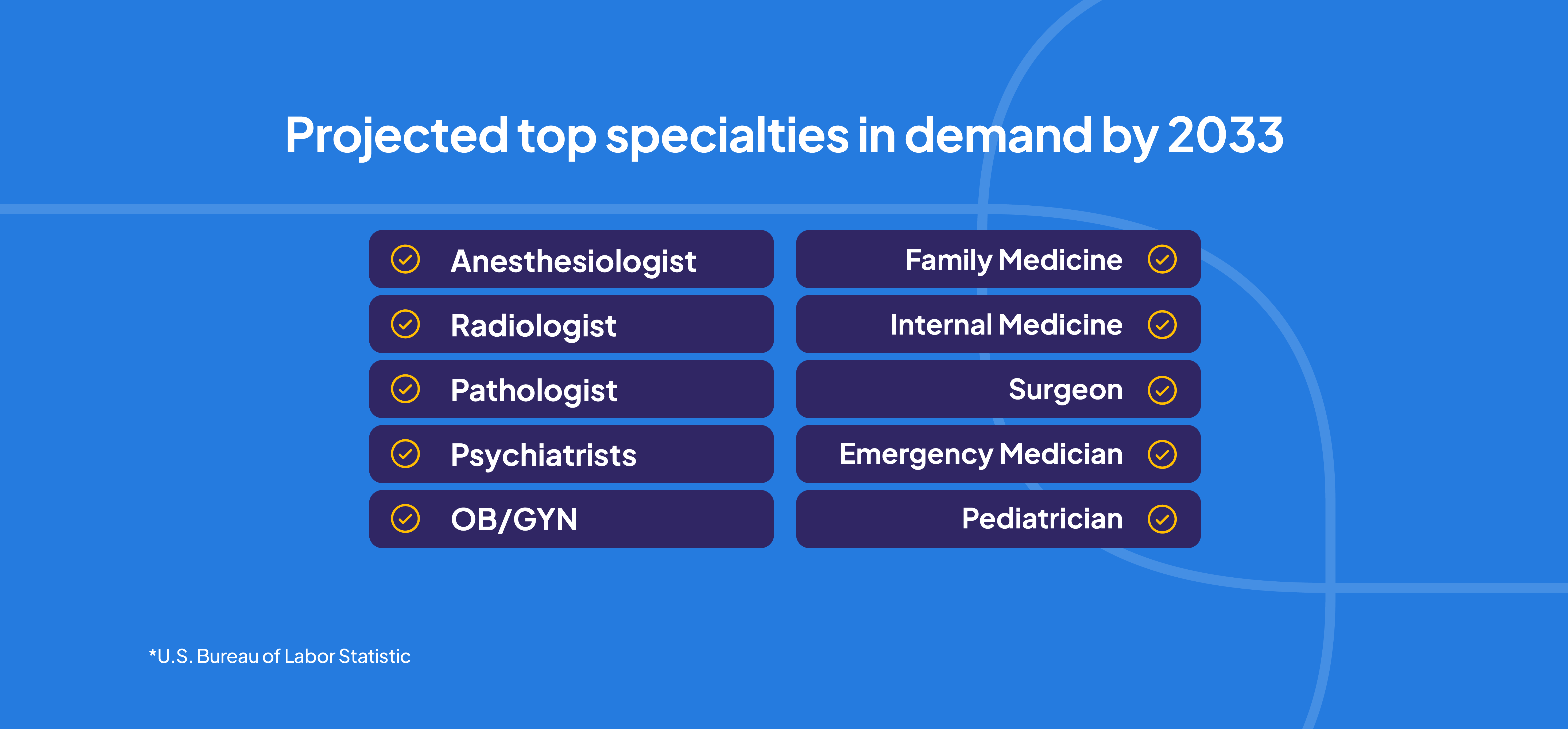
Finding the right fit
Identify your goals
The first step in your physician job search is to reflect on your long-term career goals. Doing so will help you concentrate on opportunities that align with your aspirations. DocCafe created a comprehensive, step-by-step Resident Physician Career Guide to help you navigate the road ahead.
Some questions to consider:
- What are your professional interests? Identifying your areas of interest can help you target specific roles or specialties.
- Where do you want to practice? Geographic location can significantly impact your work-life balance, salary expectations and overall job satisfaction.
- What are your financial goals? Understanding your financial needs and expectations will guide you in negotiating salaries and benefits.
Research potential employers
Next, go beyond the job posting and research potential employers. Aim to understand the cultures, values and reputations of the organizations you're considering.
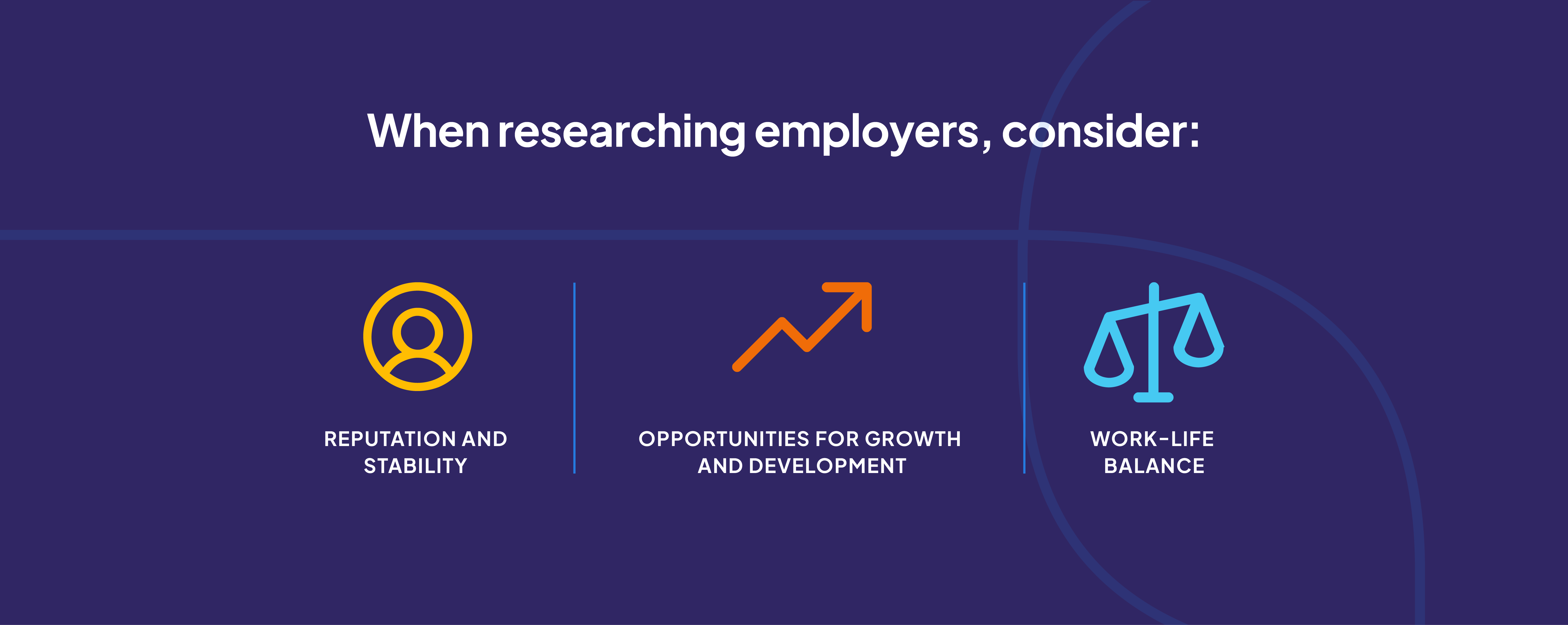
How to write a medical CV
Key components
Your CV is your first impression on potential employers, so it's essential to make it count. A well-formatted medical CV should highlight your education, clinical experience, research and any relevant skills or certifications.
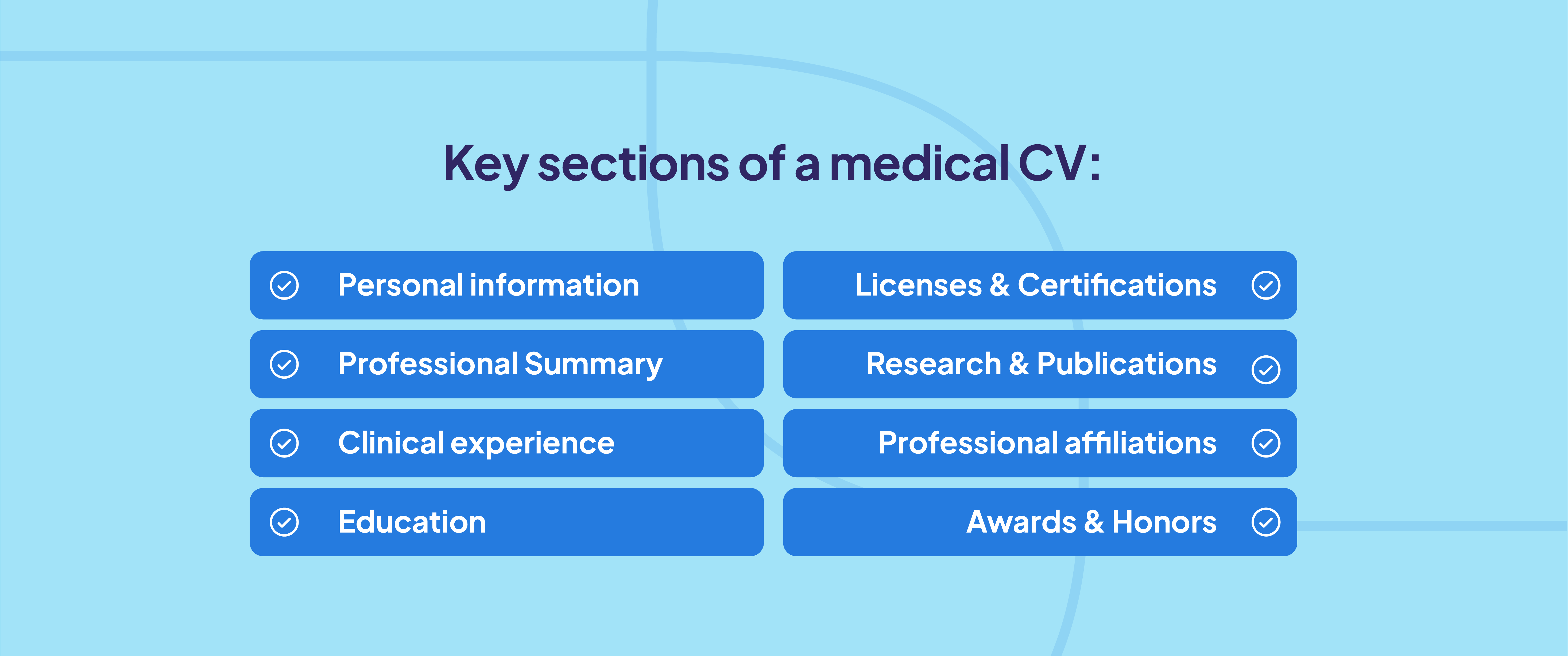
For more tips on creating an effect medical CV, download our CV template.
Optimizing for ATS
Most employers use an applicant tracking system (ATS) to streamline recruitment. This process screens applications by automatically filtering and ranking CVs based on specific keywords, making it crucial to design your CV with the right formatting and structure to align with ATS criteria. Failure to do so could result in your application being filtered out before a human recruiter ever sees it.
Visit our blog for more tips and tricks to optimize your CV for ATS.
Common mistakes to avoid
- Providing unnecessary information: Be concise and focus on relevant experience.
- Typos and grammatical errors: Proofread your CV multiple times and ask someone else to review it.
- Using a generic template: Customize your CV to make it unique and specific to each job you're applying for.
Utilizing your network
The importance of networking
Networking is a powerful tool in the physician job search process, and building a strong professional network can open doors to opportunities that aren't advertised. So, how can you network effectively?
- Attend conferences and events.
- Join professional organizations.
- Stay in touch with mentors and peers.
- Build a strong and professional online presence.
Leveraging online platforms
In today's digital age, online platforms like LinkedIn and Doximity can be invaluable tools for networking. Make sure your profiles are current and reflect your professional accomplishments and aspirations.
Tips for using online platforms
- Connect with others: Proactively seek out former classmates, colleagues and professionals you admire.
- Join relevant groups and forums: Increase your visibility by engaging in discussions and sharing information.
- Don’t forget to follow up: Connect online with people you’ve met at conferences or in the workplace by sending a personalized message to keep the conversation going.
Interviewing
Understanding the interview process
The interview process is your opportunity to showcase your skills and experience. It's also a chance for you to learn more about the organization and determine if it's the right fit for you. Interviews for medical positions can vary in format, including over the phone or virtually online. Site visits typically include one-on-one interviews and/or panel interviews.
Common interview questions and how to answer them
Feel more confident and make a stronger impression by being prepared for common interview questions, like:
- "Tell me about yourself." Use this opportunity to provide a brief overview of your background, education and career goals.
- "Why are you interested in this position?" Tailor your response to show that you've researched the organization. Explain how the role aligns with your goals and how you envision yourself making an impact.
- "Describe a challenging case you've handled." Provide specific examples of your problem-solving skills and ability to work under pressure.
Post-interview follow-up
After your interview, it's essential to follow up with a thank-you note or email. This is an opportunity to reiterate your interest in the position and express your appreciation for the interview.
Tips for post-interview follow-up
- Send thank-you notes within 24 hours to show promptness and enthusiasm.
- Personalize your message by mentioning something specific from the interview that resonated with you.
- Restate your interest in the role by reiterating why you believe you are a good fit for the position.
Physician job search tips after residency FAQs
How do doctors find jobs after residency?
Doctors typically find jobs through a combination of networking, career fairs and recruiters. Many facilities also have internal postings for residents to apply for full-time positions. Additionally, online job boards for physicians, like DocCafe, are great resources for finding opportunities nationwide.
When should I start looking for my first physician job after residency?
It’s best to start looking for your first job 12 to 18 months before completing residency. This allows time for exploring opportunities, interviewing, negotiating contracts and obtaining necessary licensure or credentials. Download our free Resident Physician Career Guide for a complete roadmap of how to conduct your job search.
What are the pros and cons of working as a locum tenens physician versus a permanent role?
Both locum tenens and permanent roles offer unique benefits that can cater to different career goals and lifestyles. Locum positions provide flexibility, competitive pay and opportunities to travel and experience diverse practice settings. Permanent roles offer stability, the chance to build lasting relationships with patients and long-term career growth within a single facility. Whether you're seeking the freedom of locum work or the stability of a permanent role, both paths can be fulfilling. DocCafe offers thousands of new job opportunities daily and our partner, Aya Locums, offers exciting locum opportunities across all specialties, nationwide.
Can I negotiate my first contract as a new attending physician?
Yes, you can and should negotiate any employment contract. Focus on compensation, benefits, work schedule and non-compete clauses. Hiring an attorney or contract review service that specializes in physician contracts is common and can help ensure you're getting a fair deal.
Will I need to move after residency to find a good job?
Many physicians stay in the region where they completed their residency, but others move based on their personal or professional preferences. If you're open to relocating, you may have more job opportunities, particularly in underserved or rural areas.
Conclusion
Navigating the job search post-residency can be a complex and challenging process, but with the right strategies, you can find a position that aligns with your goals and sets you up for a successful career.
Keep in mind that finding the right job is just the beginning. Continuously seek opportunities for growth, stay connected with your professional network and remain adaptable to the evolving landscape of healthcare. With determination and careful planning, you can navigate the physician job search process with confidence and secure a role that fulfills both your professional and personal aspirations.
All information, discussions and opinions contained within this blog or otherwise on the website or any linked materials (“the “Blog Content”) is for general informational purposes only. All Blog Content is based on the author's opinions and experiences and is not necessarily representative of our opinions as an organization. It should not be considered as tax/financial advice, legal advice, compliance advice, health advice or other professional advice and does not constitute the practice of any medical, nursing or other professional healthcare advice, diagnosis or treatment or provision of legal services. You should seek professional assistance for any concerns or issues. If you or any other person has a medical concern, you should consult with your healthcare provider or seek other professional medical treatment immediately. While we strive to provide accurate and up-to-date information, we make no warranties or representations regarding the completeness, reliability, or accuracy of the Blog Content. Your use of the Blog Content is solely at your own risk and we will not be liable for any damages or losses arising from the use of, or reliance on, any Blog Content.





 Mike York
Mike York
Comments